We have a world to win
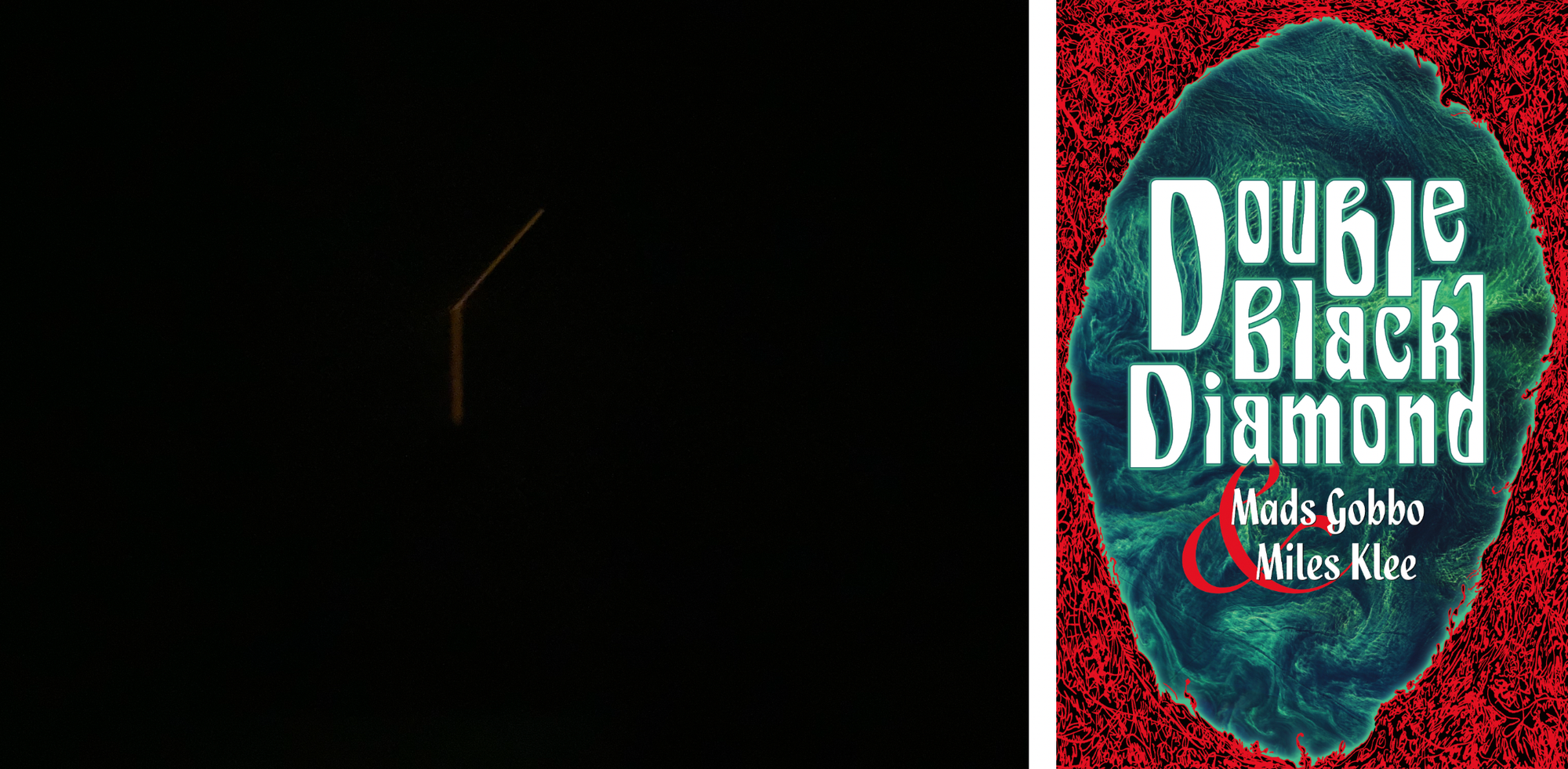
I love writing very much but Being A Writer on the other hand sucks so bad dude. Every other part of the job I mean. Never more so than when you have a book coming out. (Which I do in case I haven't made that clear.) Having to go around peddling it like a door to door salesman with a sad little briefcase. It's humiliating. So I'm sorry to anyone who I've pestered of late but that is how it is.
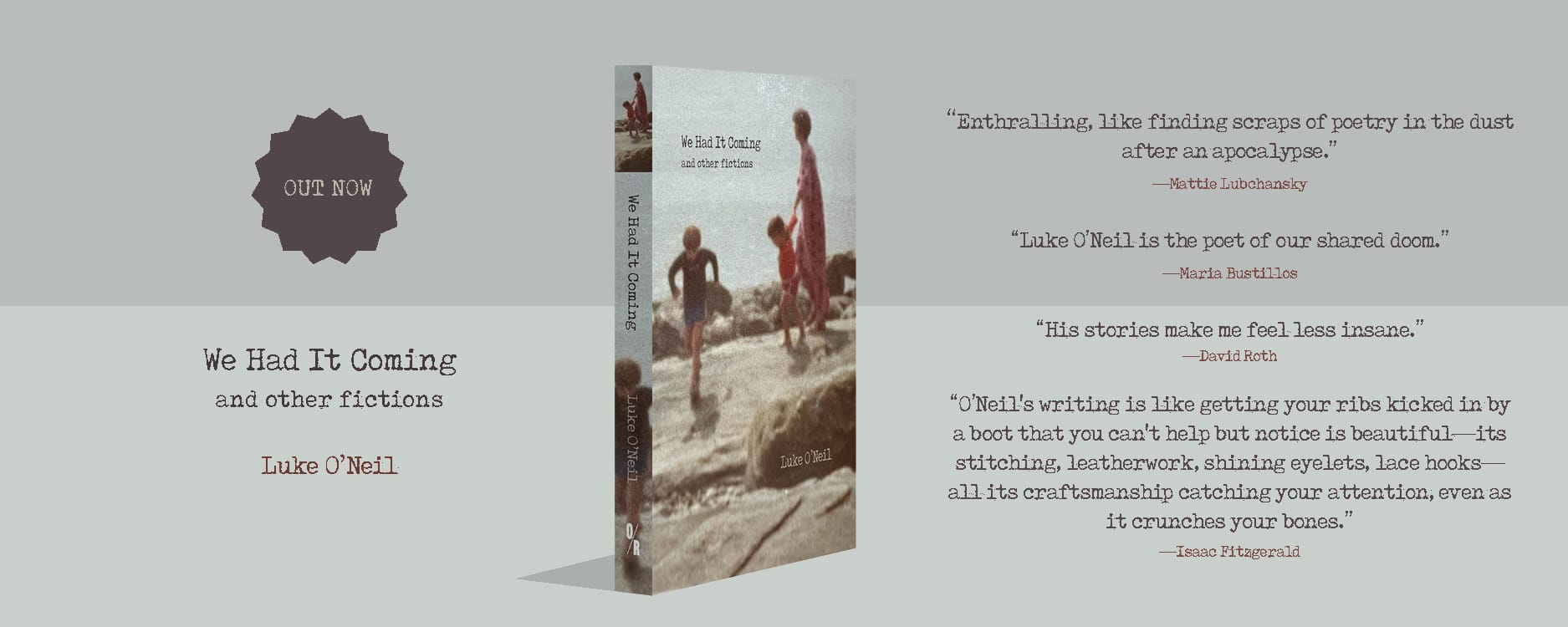
Another thing is you have to read so many other people's books because that is also part of the bargain. Sometimes it's a slog. Oh god what does this asshole want? And sometimes – like with the new Double Black Diamond by Mads Gobbo and Miles Klee (my Flaming Hydra comrade) any reservations I had about the Chore of Reading evaporated about two sentences in.
“None of us had been murdered before. It was getting to be an embarrassment.”
That story – about a group of outcast teens trying to lose their virginity so to speak after the invention of a new kind of dying – sets the tone for an immediately engaging and immersive collection of shorts both bizarre, gut-punching, romantic, horrific and funny. You can find a few excerpts here.
I haven't been reading much in the way of short story collections for a while now. Part of that is that I gorged myself on so many of them for so many decades that I needed a good long break. Part of it is that when I'm writing short story collections of my own I just don't really want to be aware of How Short Stories Are Now. That's probably bad advice for any aspiring writers out there so don't listen to me.
The final and biggest part is that my brain is fucking fried and I drink too much at night. But I'm very glad I read this one. I think if you like my shit you'll like it too. Albeit with a lot more plot and characterization instead of my innovative style of A Guy With a Concussion From His Phone Walks Around and Looks at Nature Sadly.
"The future is fucked and it is already here," the book description announces.
I chatted with Mads and Miles about their book (available now), the short story in general, how their collaboration process worked, and whether or not the world is indeed fucked.
On that question by the way I am sort of in a headspace this week where I am trying my best not to look. I know it is my job to Perceive the Horrors and Digest Them but I need a little repreieve. Has anything really bad happened lately by the way? Maybe not! Maybe in the time since I turned around everything has repaired itself while I wasn't looking. That's possible. You have to think that that's possible.
If you missed it I also interviewed Rax King and Mattie Lubchansky about their recent books here and here.
After the chat paid readers can stick around for more from me including a short story from my new book about a school shooting. Fun stuff. It goes in part like so:
I punched a hole in the goddamned wall. I’ve never done that.
Ok once during a football game I was watching.
It wasn’t even that poorly received at home. The punching. How a family would normally look upon a father doing that. I thought briefly my wife might even punch a smaller hole of her own and then the kids too one by one. Each hole smaller than the previous one on down the line as per relative fist size. Having to hold the hand of the youngest to manage it.
Later after another shooting we could use the holes to measure how much bigger they had grown. Little pencil marks scribbled onto the crumbled plaster.
Only a couple days left in Hell World 7th Birthday Month so this discount is good until Sunday.
33% off a year of Hell World!
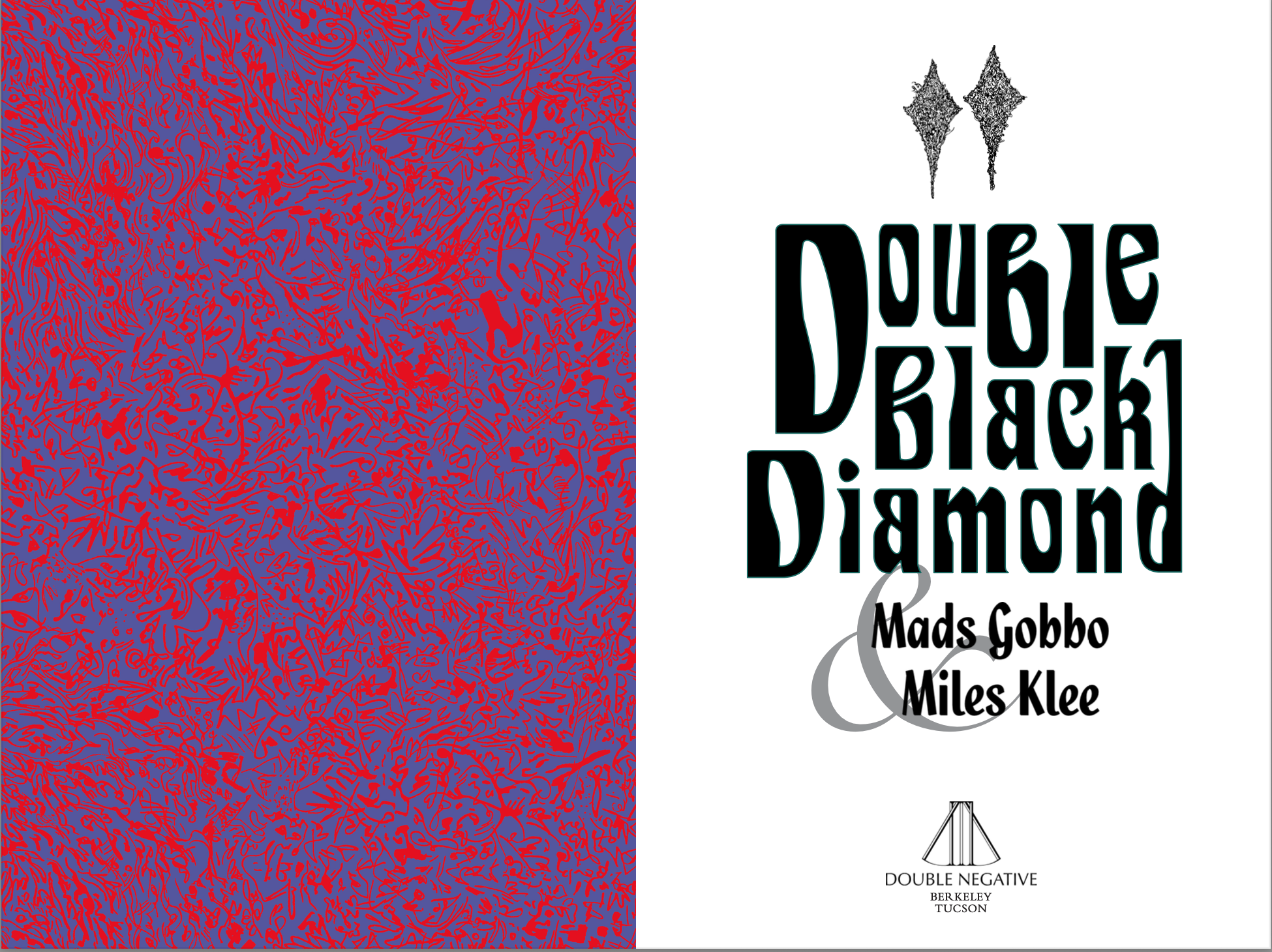
You mentioned something about “keeping the short story alive” to me the other day Miles. It’s true that you don’t really hear people talking about – or writing about – short story collections much anymore. Or any books for that matter of course. Unless it’s a novel by some twenty seven year old vaguely attractive fascist. And certainly no one pays attention to poems for Christ’s sake. Outside of TikTok friendly dog shit. I sort of consider it an act of defiance to keep working in either medium myself. I have no interest in the novel personally. Why short stories for you two?
Mads: Miles and I wrote these stories ten years ago, while we were living on opposite coasts, stealing time from our jobs to trade paragraphs or pages. The short story was an accessible form of collaboration and an opportunity to create something intricate and alive with someone I loved. It was also a message system. This collection is made of secret codes and intimate fantasies. A novel only has one secret. Stories are infinite.
There’s a George Saunders influence in here in a way that I was delighted by as opposed to annoyed by. A hard thing to do! These are similar to the kinds of worlds he might have devised, but the language is its own thing. Where do you differ or see similarities?
Miles: We love Saunders, and the funny thing for me, at least, is that my creative writing professors read what I was turning in back then and said, we know just the guy you’ve got to check out. It was Andrea Barrett who gave me CivilWarLand in Bad Decline at the end of a semester. So in some way I was already mining the same territory without knowing it, probably an effect of having a shared influence like Kurt Vonnegut. As far as being able to pull it off, it’s always important to know that you will never be able to do it exactly like someone you admire, which frees you up to move in different or contrary ways. I find that George’s stories often hinge on moral conundrums—how should a person be?—that we are less concerned with. That said, we sent him a copy of Double Black Diamond and hope he loves it regardless of our nihilism.
Any other important influences or rip-offs?
Mads: I grew up in a short story household. My dad read William Saroyan’s Fresno Stories to us at bedtime. My mom introduced me to T.C. Boyle and Italo Calvino, wonderful architects of miniature worlds. My grandmother Anna was a reader and writer of Italian racconti and often recited the opening lines of Dante’s La Divina Commedia as a party trick. I return to Calvino’s Italian Folktales like a peasant woman visiting her ancestral well.
Miles: I think of It Is Valiant to Be Simple as very indebted to Mikhail Bulgakov, although probably not as unhinged as he would have been. The Stench is very much an imitation of Steven Millhauser, who is a master short story writer in so many ways but especially in depicting how an ordinary American town is completely unraveled by an extraordinary phenomenon. We’re also obsessed with Rachel Ingalls, Joy Williams, and Shirley Jackson.
I read the first two lines of the first story and was already hooked by the concept and felt I was in safe hands with the book from the get go.
“None of us had been murdered before. It was getting to be an embarrassment.”
Did the lines come first or did they come in retrospect from the bigger idea? And explain a bit of the premise here without giving it all away if you can.
I like how some of the people in this world aren’t really into it. Being resurrected over and over again. That is exactly how it would be. There would be analogue types. Hipsters for authentic death. Also it’s also a metaphor for virginity I think?
Miles: Yes, it would feel very phony to depict some earth-shaking civilizational shift without acknowledging how some didn’t go along with that shit. We didn’t quite recognize that resistance to the protagonist, Esther, until we had gone over the story many times – but it was always there, just as there will always be a teenager rolling their eyes at the rest of their age group. Without spoiling too much: she is the one friend in a bunch of high school outcasts who questions their collective desire to become the perfect victim of a romantic murder in a world where that is the new sex. (David Cronenberg and J.G. Ballard are equally to blame for this one.) That concept came before the opening line, which fell into place incredibly easily once we knew the premise and the angsty adolescent register we wanted to work in.
99% Pure is about people eating mutated and radioactive shrimp to survive. This one feels like it would fit in fairly seamlessly in my book. Strip out all the commas first. Especially the last line where they wonder why they’d never eaten their cats instead.
Miles: Absolutely. You write about collapse in a way that is also that compact yet universal. I’m thinking of a story in your collection, Believing you will receive, about a guy going over to his pal’s house to say he’s getting a divorce, and they have to chew the fat in this very economical way to get through the dude conversation. There’s a perfectly true line: “A person can become accustomed to almost any kind of pain.” 99% Pure is a similar glimpse into how automatic survival can be, and how puzzled we are by our own resilience.
“I’d asked my priest friend to get me pregnant” is another grabbing opening line. How much emphasis did you put on those? For me it’s basically the first line and the last one that matter and anything that happens in between them is really none of my business. More bread, less sandwich meat. The last one, ideally though, is the one that should put everything into place in my opinion.
Miles: The first lines were always about locking the other person into the game of the story, and we put enormous pressure on ourselves to impress each other whenever it was our turn to begin. I imagine those openers would be intriguing and seductive in any context, but they work even better as urgent messages in bottles.
Here's a closing scene of yours I really liked as well:
“As the conductor enters the car she looks out the window again and sees ash falling in greasy folds on a field of still-black cows. The conductor is at her side, gesturing impatiently for the ticket. ‘Is that snow,’ says Katherine-Grace instead."
When it comes to finishing a story or poem I think sometimes of a master thief listening to the gears inside of a safe and then hearing the correct sound that opens it all up. Or a trap door opening.
Mads: A trap door is right. I used to teach the short story to college students, and they all seemed to think the last line should tie up everything in a big satin bow with the moral attached like a gift tag. Not subtle. But for me, the best short fiction works through discomfort. A reader shouldn’t know what it all means at the end. The story should, ideally, live inside them like a parasitic fungus, flaring at times of high moisture and abundant nutrients to offer a new perspective.
Miles: I would rate last lines as ten thousand times harder than first lines. I believe almost any literate person can write the good first line. In that sense I say your similes here are right on: a good ending feels like you’re getting away with something. The conclusion of The Old, Old, Very Old Man, which you’ve quoted there, was one of those dreamy visual abstractions that I think literature now has the pleasure of robbing from cinema. Practically speaking, it has nothing to do with the story you’ve just read, apart from the character. But, ideally, it snaps you into this stark postcard that fully describes the horror of the vacation she’s been on and the permanent break from the “friend” she was traveling with.
I asked this of Mattie L. recently, mostly because it’s something I really do not pay much attention to myself, but what kind of work goes into plotting for you two? Are there outlines to begin, or just general ideas that you write your way through and find your way as they come to you?
Miles: We have to know from the start, in a broad way, what the rules of the world are, and those are often clarified and ironed out in drafting and revision when we realize something doesn’t make sense, or we’re overexplaining, or we haven’t actually agreed on an answer to the natural question a reader would have. The plots are a little more fluid, we can throw each other some topspin and play it more as a tennis match until it seems all the strokes of the narrative are there, then go back and haggle over which should have gone differently. Certainly there are a number of third-act stunts in the longer stories that took many failed attempts.
Mads: We always try to surprise each other. Zig and zag, like expert skiers. Double black diamond. That’s where the title of the book comes from, though I do not ski myself.
Some of these are high concept enough that I could envision them being optioned and then rewritten by ten people and ruined and turned into a shitty movie. Complimentary. The first story for sure. The Poison Ivy one too. Is that something you have your eye on?
Miles: We’d love to sell out. Arguably it would be even better to sell the option on a story that the studio never exercises (but we still get a payday). Total Farce, the first story, is definitely one that my agent believes has Hollywood potential, but apparently the market swings back and forth every six months in terms of whether the movie business is desperately snapping up new intellectual property or completely locked into a reboot/franchise phase. Still, it’s for sure the strongest elevator pitch, and the story has enough to support a feature. Superbad meets Heathers or something. Seeing those roles performed would be really fun.
Mads: Scouts please reach out.
How exactly does the actual tag-team writing process work here? You are romantic partners as well right? Does that help or hinder things because I could see it going in either direction. I’ve had to edit friends many times, and I don't love it. I can only imagine that feeling is exacerbated when it’s someone you have to share a bed with.
Mads: Remember, we were in a tortured long distance relationship as the first drafts of these stories were being written. For me, the creative process was a test and a window on the future of our relationship. Is he picking up what I’m putting down? Are we equally inspired by each other? So it was exciting. I was in my twenties then. Our relationship endured and matured, and our creative practice now is about revising what began at first blush. To finish this collection we collaborated with our younger selves, which was tender and delicate work.
Miles: After we concoct what improv comedians call “the unusual thing” – that is, the reason we’re reading – one of us will just kick it off. They take it a certain distance, sometimes a few sentences, maybe a couple of paragraphs or a whole page, before passing it off to the other person. It’s not quite an “exquisite corpse” process, because you get to see the latest addition and have to meet the challenge of taking it from there, but it’s a similar concept. This means we are always trying to one-up each other, in an affectionate and romantic way of course, as we build to a natural climax. (I realize how horny this sounds.)
Is there a John and a Paul so to speak? A cynic and a sentimentalist? Someone is certainly horny here, but in a deliberately un-horny way if that makes sense. I don’t know Mads personally, but I’ve seen enough of Miles' posts to take a guess.
Miles: I’m a sentimentalist who fakes cynicism. I cried the last time we watched The Wizard of Oz. I also think about sex a lot, or enough that when we got the book in finished form, I wondered if we had gone a little too light on that.
Mads: I’d prefer Yoko, thank you. I’ll cop to the erotics of our creative process. Our first collaborations were not short stories, but very very long text messages describing fantasies where we could be together physically. The sexts became so elaborate we switched to a Tumblr with original illustrations (RIP Planet Sext), then moved into the formal setting of the Google doc to start writing proper stories for general audiences.
There are supernatural or science fiction elements throughout, sometimes overt, sometimes weaved in subtly for the most part without too much explanation – the girl at the aquarium, Poison Ivy… Are all the stories, or any of them at least, set in the same world?
Miles: I wouldn’t have said so, but I’d never discourage that reading. There’s a reason they all sit and make some kind of sense together. The little girl in Her Miserable Destiny growing up to be Poison Ivy in What It Actually Does is actually an amazing pitch – someone whose profound abilities outstrip her understanding of what to do with them.
Again, like my book, the copy describes this as taking place in a world soon to come. Explain a little about what is meant by that.
Mads: Double Black Diamond isn’t a cautionary tale. The future is fair game and fertile ground for collaboration. If we accept our responsibility to shape the future instead of always imagining a worse time yet to come, we have a world to win. Maybe that makes me hopecore, but fuck it.
Double Black Diamond is available now.
"My friend Victor like saved me though, because he laid on top of me. But he got hit." 10-year-old describes witnessing Minneapolis shooting.
— MSNBC (@msnbc.com) 2025-08-27T17:59:07.994Z
this picture of a mom shoes off sprinting to the Mpls school: www.startribune.com/minneapolis-... By Richard Tsong-Taatarii for @startribune.com, which should be a go-to source for anyone following
— Clara Jeffery (@clarajeffery.bsky.social) 2025-08-27T18:38:45.044Z
Here's a story by me. This one appears in my forthcoming book We Had It Coming. You'll have to be a paid subscriber to read the whole thing.
That's right buddy.
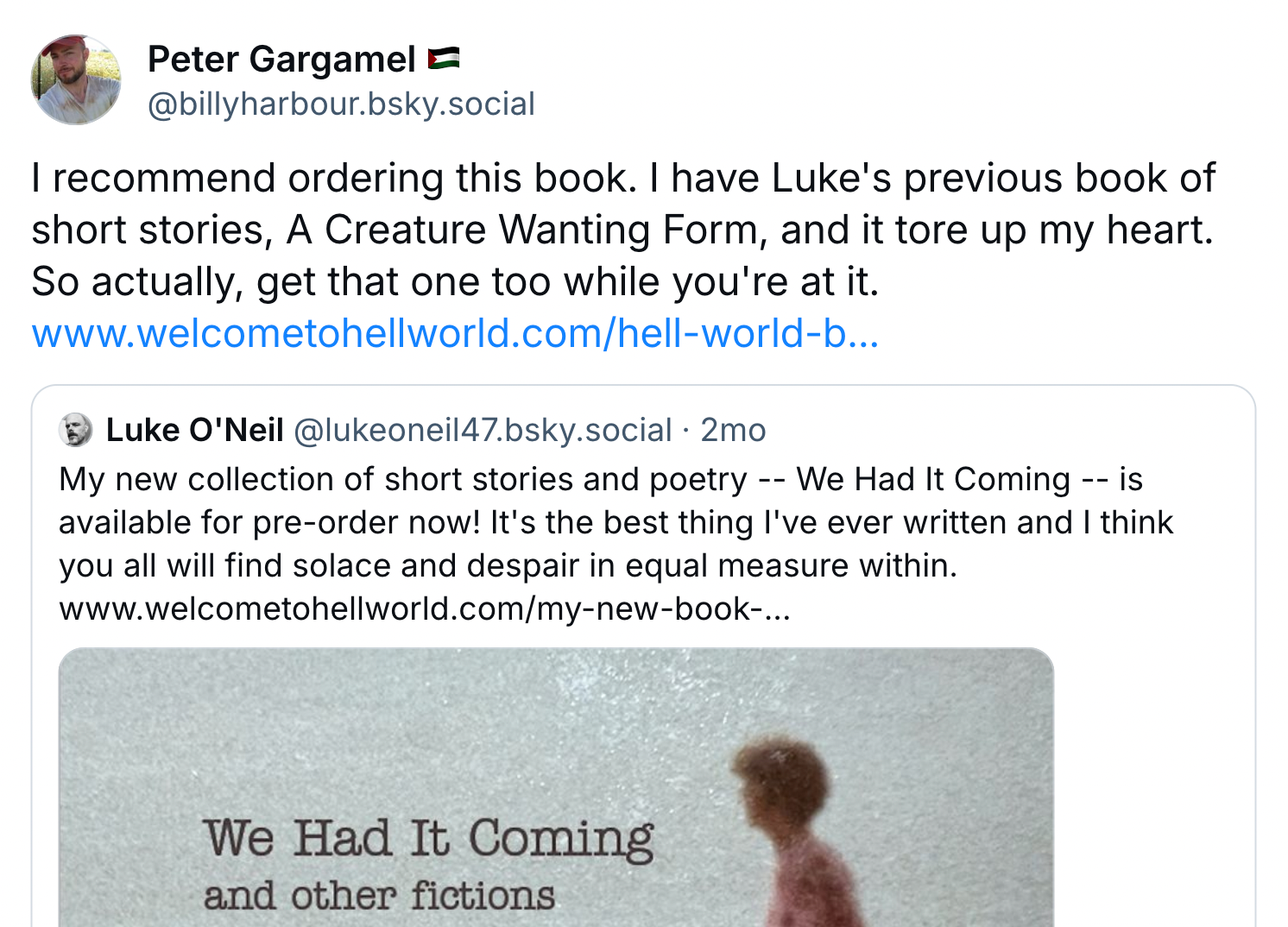
After that some other bullshit including The Best and Worst Photos I Looked At This Week.
Thank you for reading as always.
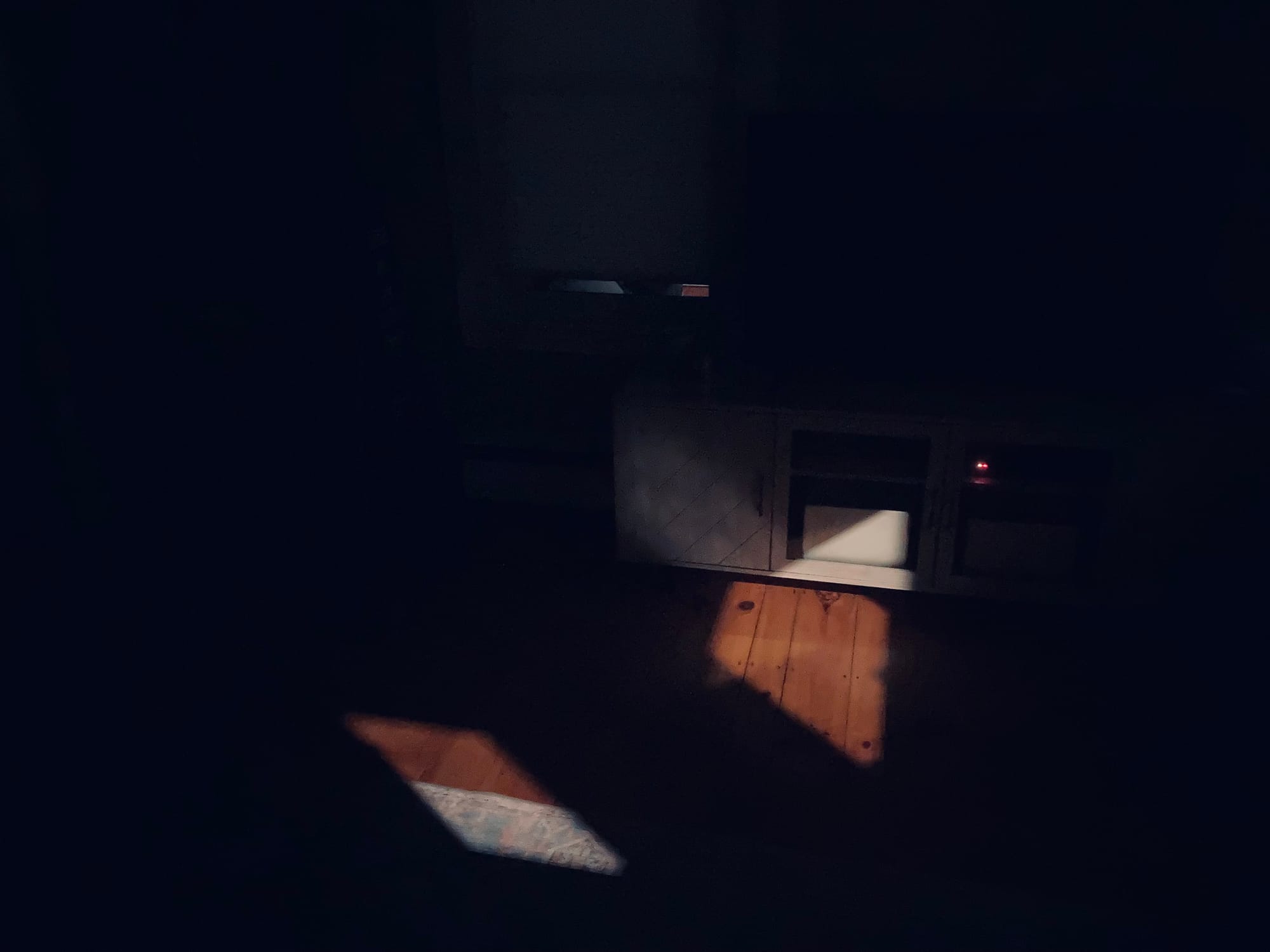
A hole in the wall
They slaughtered a score of kids and a mess of their teachers an hour from here. This was all supposed to be happening somewhere else. Somewhere we could fret about it sure but not be made to weep deeply over it. The kind of thing you give an afternoon of attention before forgetting.
An iceberg melting and collapsing into the water in Antarctica is one thing but now imagine it happened right there off the side of the highway on your commute to work.
It was an individual shooter not a plural they or a gendered they. But they did it nevertheless. All of them.
We despaired and so could think of nothing to do but post. To write something beautiful or angry. Both at once. Devastated but not defeated. Not fully defeated. Not even now. To reassert our collective humanity. To remind ourselves that this is all worth it somehow. All of this living.
A shortage of beauty of late as it happens. We've dug the beauty mines clean. The children we sent down into them to burrow haven’t returned.
It was enough to make you want to get a gun.
Perhaps it would be better to post something profane. There's no shortage of ugliness to be found in this latest massacre.
Everyone we knew knew someone who knew someone.
I punched a hole in the goddamned wall. I’ve never done that.
Ok once during a football game I was watching.
It wasn’t even that poorly received at home. The punching. How a family would normally look upon a father doing that. I thought briefly my wife might even punch a smaller hole of her own and then the kids too one by one. Each hole smaller than the previous one on down the line as per relative fist size. Having to hold the hand of the youngest to manage it.
Later after another shooting we could use the holes to measure how much bigger they had grown. Little pencil marks scribbled onto the crumbled plaster.
I should not have done that. I know that. But then again what should I have done?
